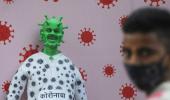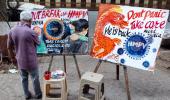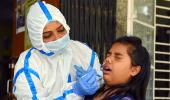'People don't need to take any added medication other than plain fever medication.'

Infectious disease physician Dr Trupti Gilada divides her time between the Unison Medicare, Saifee, Wockhardt and Bhatia hospitals in south Mumbai.
She has been seeing quite a few cases of the JN. 1 strain of COVID-19 in outpatients, over the past two to three weeks, but none are admitted in these hospitals.
It is not very common for doctors like her to test a person suffering upper respiratory tract or mild flu-like fevers. A patient is merely monitored for 2-3 days.
But routine surveillance tests are carried out, "not to diagnose, but just to keep a watch on what's happening" and about three weeks back she started seeing more and more COVID cases.
At last count, Mumbai reported 95 new cases in May.
Vaihayasi Pande Daniel/Rediff asked Dr Gilada for her assessment of the unfolding situation and the kind of precautions required, if at all.
"Basic levels of precautions should continue. If someone has a cold or cough, it's a good idea to stay home and not go to school or offices and mask up," says Dr Gilada.
On the cases she has seen recently:
In the last two weeks we've seen quite a few flu-like fevers, fortunately very mild. Even those who were diagnosed with COVID-19 were very mild. Not very long illnesses, lasting a few days. Fever, body aches, some sore throat.
That's it. Nothing in the hospital. Fortunately. I haven't seen anyone get to the hospital with COVID pneumonia or something like that.
On whether the situation looks worrying:
It's like flu. Honestly, this is something we expected will happen with COVID-19. Every time there's a little mutation that changes the variant, there might be a slight surge in the number of cases.
But we are certain that immunity from previous infections does offer some protection for future ones, both in terms of acquiring a new infection or even the severity of infection. And just like how we would see flu surges, through the year, sometimes in the winter or the monsoon, this is one such surge of COVID-19.
From Singapore and Thailand, we know the variant. I don't think we know the variant in India yet, but it must be something similar to that, all variants of Omicron.
Is masking up required:
I'll tell you something, very honestly. Masking for the whole population is something that is not sustainable. The moment we tell the people to mask up, they're like: 'Oh my God, they've started all over again'. So, this isn't the point when I would hit the panic button and say: 'Mask up, everyone'.
What about people with underlying medical/lung conditions:
Basic levels of precautions should continue. If someone has a cold or cough, it's a good idea to stay home and not go to school or offices and mask up.
For those who have underlying lung conditions, we anyway tell them that they should avoid crowded places, places where there might be too many people at a very close proximity and where they could catch viral infections easily.
Those background precautions, for those with underlying lung diseases, should be kept in mind at all times... We don't really always need to give out a directive for these people (with underlying conditions). They should, in general, take care of those things. Against the background of a surge going around in the city, you buckle up even more.
Does a higher number of cases indicate anything:
It's definitely more cases. Our yardstick now is what reaches the hospital. Nothing seems to have moved on that yardstick. Everything looks the same.
Of course there are more cases. Maybe we are not seeing those numbers in other cities or towns yet, and that's because they're not being tested. But I'm sure if we were to just ramp up testing, we will see a lot of COVID.
Should we test:
I'm not trying to suggest that we should ramp up testing.
Of course, surveillance testing should continue because that gives us an idea of what's happening, as a background.
But in terms of individual patient care, it doesn't change much. I give them all symptomatic treatment, irrespective of what viral it is, and most of these infections pretty much do resolve.
(Bombay tests more) because it's just our culture to be vigilant. We have the big disadvantage of being such a crowded, humid city right now, which is like the perfect atmosphere for any violent illness.
Both Bombay and Kerala share that culture (of vigilance). We want to know what's happening and know if we need to be vigilant. There is a good culture of just doing surveillance tests. It's also about very open data sharing too.
The possibility of the strain turning virulent:
Whenever there is more multiplication, there is definitely chances of more mutation.
But there's a very interesting trend in viruses that's well known. It's that over a period of time, viruses will mutate to a more infectious strain and to a strain which is milder and does not kill the host.
The only way the virus will survive is if it just increases its infectiousness and doesn't really kill the host. That's a natural trend of any organism to survive longer.
Number two, now that we've had so many surges of COVID over the last four or five years, there is a general level of immunity, both individual immunity and herd immunity.
And that's the same for flu. There will be a span of four or five weeks where you'll just hear about everyone going down, one after the other, with runny nose, cough, fever. This COVID surge is just like one of those.
Last word:
It's not a panic situation. There's nothing too worrying.
People don't need to take any added medications other than plain fever medications. No antivirals, no vaccines, nothing.
Feature Presentation: Ashish Narsale/Rediff










